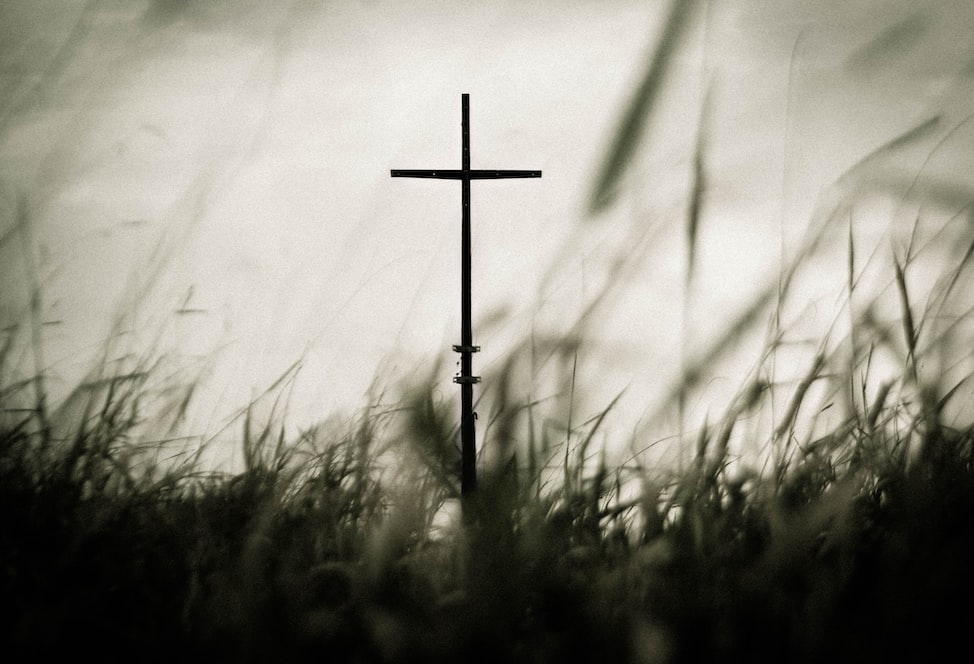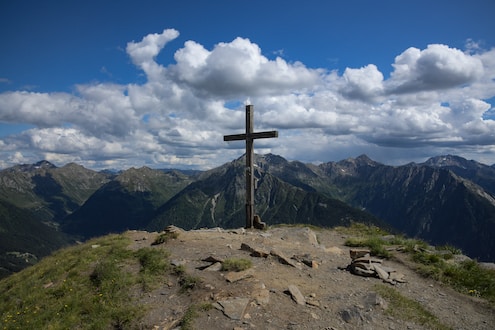
make your way to the cross
A journey to the cross
Jesus’ Journey to the Cross was Difficult
First of all, it should be acknowledged that Jesus’ journey to the cross was difficult. This might seem so obvious that it is hardly worth saying, but I think it is good to consider the difficulty of Jesus’ journey carefully.
I suppose it can be said that the whole of Jesus’ life was difficult. He was born in poverty. He was constantly opposed. Members of his own family did not at first believe in him. He was often a man on the run. The whole of Jesus’ life was characterized by difficulty. But here, I wish to emphasize that Jesus’ final journey to the cross was exceptionally difficult.
We often speak of the fact that Jesus came to die for sinners. But notice that the death he died was not what we would call a natural death. He did not die of natural causes. He did not grow old for us. He did not succumb to illness for us. His life was not ended by way of what we would call an accident. No, he was put to death by sinful men.
Jesus’ Journey to the Cross was lonely.
Consider also the loneliness of Jesus’ journey. His journey to the cross was a lonely one.
Here I wish only to emphasize the fact that Jesus walked this difficult road alone.
Judas had already betrayed him. This we have seen.
And where are the majority of the eleven who remained? Most of them have all scattered, haven’t they? What Jesus predicted came true. He said to them in John 16:32, “Behold, the hour is coming; indeed it has come, when you will be scattered, each to his own home, and will leave me alone.” (John 16:32, ESV)
This is what happened.
Notice that Peter followed Jesus. I suppose he should be commended for this. He did have the courage to follow Jesus. But do you remember the conversation that Jesus had with Peter in the upper room after he washed the disciples' feet? “Simon Peter said to him, ‘Lord, where are you going?’ Jesus answered him, ‘Where I am going, you cannot follow me now, but you will follow afterwards.’ Peter said to him, ‘Lord, why can I not follow you now? I will lay down my life for you.’” (John 13:36–37, ESV) Peter claimed to be willing to follow Jesus to the point of death. And his actions revealed that he was serious about that. What did he do when Judas let that band of soldiers into the garden? He drew his sword and started swinging! He displayed courage, did he not? But it was an ignorant courage – a misguided courage. He insisted on walking the road with Jesus when Jesus had already made it clear that he could not. When Jesus was dragged before Annas and Caiaphas, Peter was there. This was risky, wasn’t it? He was putting his life at risk. He was courageous. But again, it was ignorant courage.
Evidently, Peter was still struggling to understand Christ’s mission, wouldn’t you agree? He could not, at this time, understand the way of the cross. He could not comprehend that victory would come to Jesus through suffering and death.
He walked with Jesus for a while, didn’t he? But eventually, he hit a wall. Peter, being questioned three times, denied our Lord three times. This was to fulfil what Christ had predicted. In John 13, “Jesus answered [Peter], ‘Will you lay down your life for me? Truly, truly, I say to you, the rooster will not crow till you have denied me three times.’” (John 13:38, ESV) This is what happened.
I want to show you something interesting about the story of Peter’s denial in John 18 if you are willing to listen. Matthew, Mark, and Luke all tell the story of Peter’s denial. But, as is often the case, they provide more detail than does John. They tell us more about what was asked of Peter by his accusers. They also tell us more about what Peter said when he denied Jesus. Mark, in particular, suggests that Peter grew more and more adamant in his denial with each question asked to the point of “[invoking] a curse on himself [saying], ‘I do not know this man of whom you speak.’” (Mark 14:71, ESV)
But what does John emphasize? How does he portray Jesus’ denial? He tells us that Peter denied Christ three times with the simple words, “I am not”. Verse 17: “The servant girl at the door said to Peter, ‘You also are not one of this man’s disciples, are you?’ He said, ‘I am not.’” (John 18:17, ESV) Verse 25, “Now Simon Peter was standing and warming himself…” (By the way, notice the repetition of this theme. Twice it is mentioned that Peter was warming himself by the fire. This may suggest that Peter was concerned about his own comfort in contrast to Christ’s selfless suffering. But it might also be an allusion to the Isaiah 50 passage that I read at the beginning, especially verse 11. I’ll leave that to you to ponder) But as they stood around the fire, “they said to [Peter], ‘You also are not one of his disciples, are you?’ He denied it and said, ‘I am not.’” (John 18:25, ESV) This happened a third time, and then the rooster crowed.
So why is it significant that John uses the words “I am not” to describe Peter’s denial of Jesus, whereas the other Gospels tell us more? Think with me for a moment. How has Jesus identified himself throughout the Gospel of John? Has he not consistently referred to himself as “I am”? “I am the door”; “I am the bread of life”. “I am the light of the world”. “Before Abraham was, I am”, and so on. And even in the immediate context, we see that when Judas and the soldiers came to find Jesus in the garden and said that it was Jesus of Nazareth that they were seeking, how did he respond except with the words “I am”? In English, it is “I am he”, but in Greek, it is simply ?γ? ε?μι – “I am”.
So that is the pattern in John. Jesus consistently reveals himself as the “I am”. Clearly, this alludes to the divine name given to Moses at the burning bush, but it also communicates that Jesus is the one. He is the anointed one, the long-awaited Messiah. He alone is the one who can atone for sins.
Tell me this, church. How has Peter been acting up to this point? He has been acting as if he is. He has acted as if he could contribute to Christ’s work – as if he could walk with Christ and even die with Christ. He, at first, would not let Jesus wash his feet. He claimed to be willing to die with Jesus. He drew his sword and began to fight. And he followed Jesus to Caiaphas’ headquarters. Courageous? Indeed! But oh so misguided.
It is here that Peter finally comes to an end of himself. His flesh could take him so far, but he could go no further. He finally admits, “I am not.”
Jesus’ Journey to the Cross was Necessary
Brothers and sisters, Jesus’ journey to the cross were indeed difficult and lonely (he was abandoned by men, but the Father was with him), but it was necessary. Only he could make the journey. Only he could walk that road and drink the cup that the Father had given him to drink. He was uniquely called, uniquely anointed, and uniquely qualified to suffer and die and rise again on the third day for your sins and mine and for all who trust in him in every age and in every place.
There is one other figure in this passage that we have not talked about yet, and we should do so briefly before we conclude. Look at verse 15. It says, “Simon Peter followed Jesus, and so did another disciple. Since that disciple was known to the high priest, he entered with Jesus into the courtyard of the high priest…” (John 18:15, ESV) Who do you think these other disciples is? Certainly, this is John! He never names himself in his Gospel, but he appears in the narrative from time to time. Here he is called “another disciple”. In John 20, he is called “the other disciple”. He is the one who outruns Peter to the tomb. In John 21, he is “the disciple whom Jesus loved”. He is always appearing anonymously and as a kind of contrast to Peter.
Why? It seems to me that John, though he, like Peter, was willing to follow Jesus (he did not deny like Judas nor run away like the other nine), he followed in the right way. He followed, not in an attempt to rescue Jesus and not in an attempt to add anything to the work of Christ as if that were possible. No, he followed and observed. He watched Jesus do the work that only Jesus could do. John, unlike Peter at this point in his life, was willing to be served by Jesus. He was willing to be loved by Jesus. That was his boast! Not that he loved Jesus, but that Jesus loved him and gave himself up for him through his death on the cross.
This seems to me to be the most crucial question of all. Will you have Jesus as your crucified Lord? Will you allow Jesus to serve you? Will you confess that you are needy – not able to add a thing to the work of Christ, but only able to receive that which he has graciously provided for you through his death, burial, and resurrection?
This is how we must come to Christ. We must repent and believe in Jesus. We must come to terms with our needs and cast ourselves complexly at the feet of Jesus, trusting in him alone for the forgiveness of sins. And brothers and sisters, this is what we must do throughout the Christian life in every circumstance. We must confess our need – confess our brokenness – and run to Jesus, who is the author and perfecter of our faith.

Dave Food, 03/04/2023